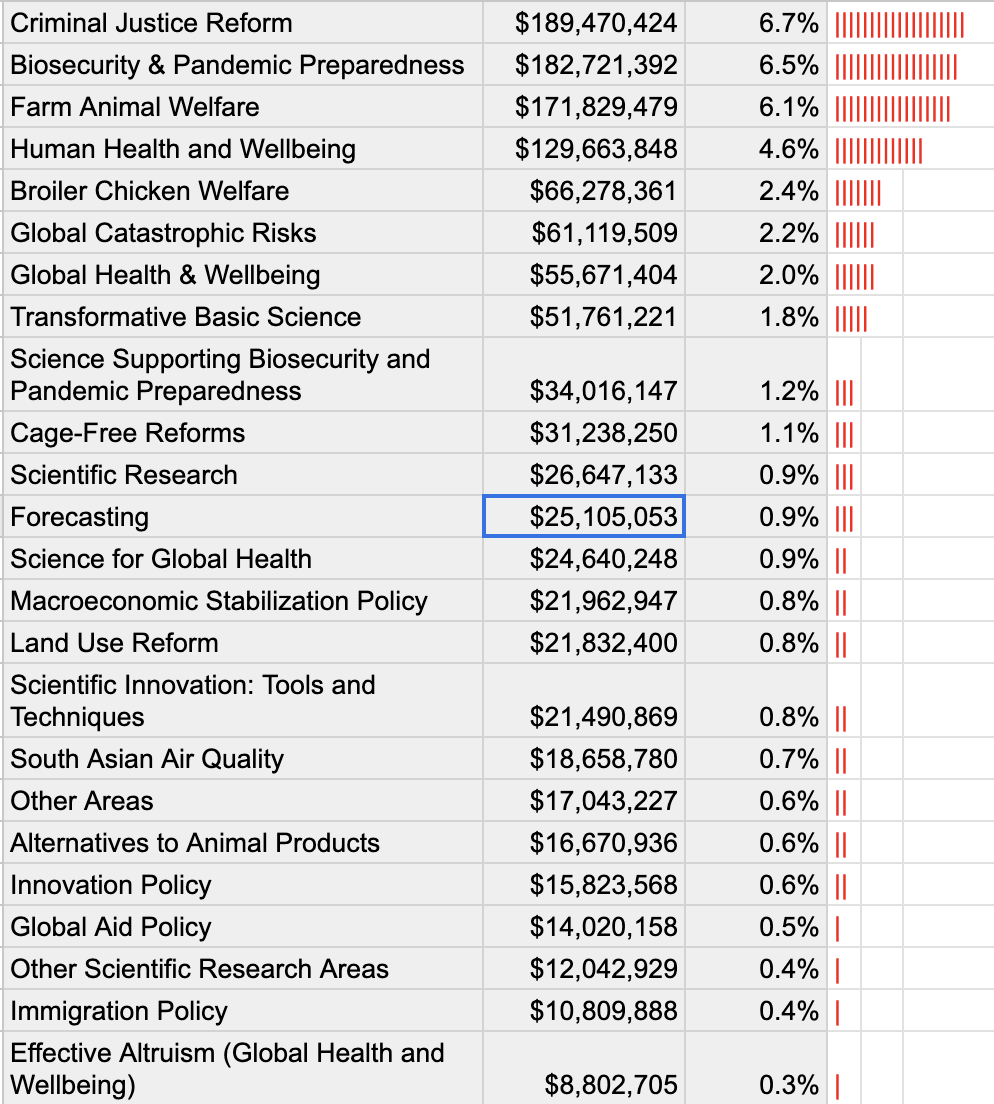Written by Benjamin Tereick
Edit: several comments here question the value of forecasting as a philanthropic cause — see this comment for a reply.
We are happy to announce that we have added forecasting as an official grantmaking focus area. As of January 2024, the forecasting team comprises two full-time employees: myself and Javier Prieto. In August 2023, I joined Open Phil to lead our forecasting grantmaking and internal processes. Prior to that, I worked on forecasts of existential risk and the long-term future at the Global Priorities Institute. Javier recently joined the forecasting team in a full-time capacity from Luke Muehlhauser’s AI governance team, which was previously responsible for our forecasting grantmaking.
While we are just now launching a dedicated cause area, Open Phil has long endorsed forecasting as an important way of improving the epistemic foundations of our decisions and the decisions of others. We have made several grants to support the forecasting community in the last few years, e.g., to Metaculus, the Forecasting Research Institute, and ARLIS. Moreover, since the launch of Open Phil, grantmakers have often made predictions about core outcomes for grants they approve.
Now with increased staff capacity, the forecasting team wants to build on this work. Our main goal is to help realize the promise of forecasting as a way to improve high-stakes decisions, as outlined in our focus area description. We are excited both about projects aiming to increase the adoption rate of forecasting as a tool by relevant decision-makers, and about projects that provide accurate forecasts on questions that could plausibly influence the choices of these decision-makers. We are interested in such work across both of our portfolios: Global Health and Wellbeing and Global Catastrophic Risks. [1]
We are as of yet uncertain about the most promising type of project in the forecasting focus area, and we will likely fund a variety of different approaches. We will also continue our commitment to forecasting research and to the general support of the forecasting community, as we consider both to be prerequisites for high-impact forecasting. Supported by other Open Phil researchers, we plan to continue exploring the most plausible theories of change for forecasting. I aim to regularly update the forecasting community on the development of our thinking.
Besides grantmaking, the forecasting team is also responsible for Open Phil’s internal forecasting processes, and for managing forecasting services for Open Phil staff. This part of our work will be less public, but we will occasionally publish insights from our own processes, like Javier’s 2022 report on the accuracy of our internal forecasts.
- ^
It should be noted that administratively, the forecasting team is part of the Global Catastrophic Risks portfolio, and historically, our forecasting work has had closer links to that part of the organization.


This will be a total waste of time and money unless OpenPhil actually pushes the people it funds towards achieving real-world impact. The typical pattern in the past has been to launch yet another forecasting tournament to try to find better forecasts and forecasters. No one cares, we already know how to do this since at least 2012!
The unsolved problem is translating the research into real-world impact. Does the Forecasting Research Institute have any actual commercial paying clients? What is Metaculus's revenue from actual clients rather than grants? Who are they working with and where is the evidence that they are helping high-stakes decision makers improve their thought processes?
Incidentally, I note that forecasting is not actually successful even within EA at changing anything: superforecasters are generally far more relaxed about Xrisk than the median EA, but has this made any kind of difference to how EA spends its money? It seems very unlikely.
It's worth saying also that we already have 1 commercial forecasting organisation Good Judgment (I do a little bit of professional forecasting for them though it's not my main job.) Not clear why we need another. (I don't know who GJ clients actually are though, plus presumably I wouldn't be allowed to tell you even if I did. EDIT: Actually, in some cases I think client info became public and/or we were internally told who they were, but I have just forgotten who.)